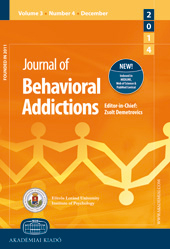Transcranial direct current stimulation for online gamers: A prospective single-arm feasibility study
Transcranial direct current stimulation for online gamers: A prospective single-arm feasibility study
Author(s): Sang Hoon Lee, Jooyeon Jamie Im, Jin Kyoung OhSubject(s): Behaviorism
Published by: Akadémiai Kiadó
Keywords: online game; transcranial direct current stimulation; positron emission tomography; dorsolateral prefrontal cortex; regional cerebral metabolic rate of glucose; self-control
Summary/Abstract: Excessive use of online games can have negative influences on mental health and daily functioning. Although the effects of transcranial direct current stimulation (tDCS) have been investigated for the treatment of addiction, it has not been evaluated for excessive online game use. This study aimed to investigate the feasibility and tolerability of tDCS over the dorsolateral prefrontal cortex (DLPFC) in online gamers. Methods. A total of 15 online gamers received 12 active tDCS sessions over the DLPFC (anodal left/cathodal right, 2 mA for 30 min, 3 times per week for 4 weeks). Before and after tDCS sessions, all participants underwent 18F-fluoro-2-deoxyglucose positron emission tomography scans and completed the Internet Addiction Test (IAT), Brief Self Control Scale (BSCS), and Beck Depression Inventory-II (BDI-II). Results. After tDCS sessions, weekly hours spent on games (p = .02) and scores of IAT (p < .001) and BDI-II (p = .01) were decreased, whereas BSCS score was increased (p = .01). Increases in self-control were associated with decreases in both addiction severity (p = .002) and time spent on games (p = .02). Moreover, abnormal right-greater-than-left asymmetry of regional cerebral glucose metabolism in the DLPFC was partially alleviated (p = .04). Conclusions. Our preliminary results suggest that tDCS may be useful for reducing online game use by improving interhemispheric balance of glucose metabolism in the DLPFC and enhancing self-control. Larger sham-controlled studies with longer follow-up period are warranted to validate the efficacy of tDCS in gamers.
Journal: Journal of Behavioral Addictions
- Issue Year: 7/2018
- Issue No: 4
- Page Range: 1166-1170
- Page Count: 5
- Language: English

